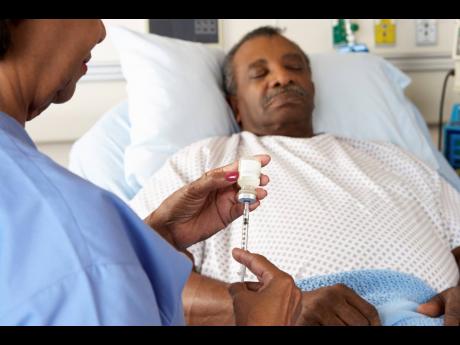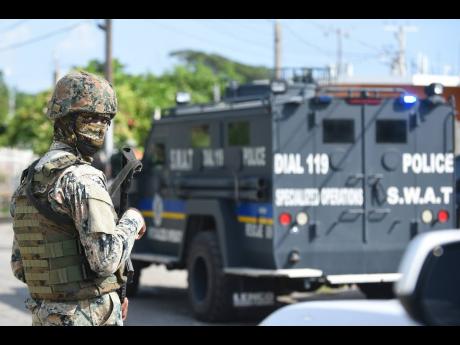Imani Tafari-Ama | What is the cost of well-being?
In response to the last article I wrote, a reader from Belize shared that the crime problem spectre I was describing in Jamaica is being replicated in that jurisdiction. Another reader suggested that solutions are dependent on willingness to confront the unpalatable factors that undergird partisan politics. Another critic said that only by improving economic opportunities can we lower threats to citizen security.
These comments made me recall some revelations from past research projects. For example, in 1996, I was part of a team of researchers whose objective was to find out whether there is a direct correlation between poverty and violence in innercity Jamaica. This project was sponsored by the World Bank and The University of the West Indies, Mona, and was the precursor to the establishment of the Jamaica Social Investment Fund (JSIF). This initiative was kickstarted with that ‘debt forgiveness’ pot of World Bank/International Monetary Fund (IMF) money.
We worked in a total of nine urban grassroots communities located in the Kingston Metropolitan Area, Spanish Town – the original capital – and Montego Bay – the second city. We used Participatory Rapid Appraisal (PRA) methods to find out what people saw as problems and solutions to their cultural development. We did not need binoculars to see the connections between poverty and violence.
The research findings, documented in They Cry Respect! authored by team leader, Horace Levy, in 1996, echoed the To Be Poor is a Crime song made popular by Freddie McGregor. The study also revealed that ‘respect’ is what people crave most. They felt that it was the institutionalised disrespect or dissing by the system that caused the approximately half a million inner-city residents to be living in the jaws of poverty.
DIRECTLY RELATED
Participants also told us that their poverty is directly related to the violence snaking its way throughout their lives. People said that if the youths were not chronically unemployed, they would not feel impelled to get involved in illegal activities to get some form of gain – whether psychosocial or material. Others noted that because reprisal ‘blood for blood’ killings are the order of the day and conflict resolution capacities were at an all-time low, the syndrome of violence could never cease. Still others said that gang warfare over turf, guns and drugs fuelled the internecine conflicts. Many concluded that these combined factors, prevent them from fulfilling their needs and wants.
These explanations do not let perpetrators of violence off the hook. But such reflections call into question class-specific policies, which have left the untenable circumstances intact for the preceding period and the 26 years that have elapsed since this study was done.
At a personal level, poverty acts as a tangible barrier to well-being. I was talking about this two weeks ago with a friend who lives in an underserved community. We focused on how health issues in Jamaica connect directly to people’s economic circumstances. Cecilia (not her real name) said she was stressed out by the violence that surrounds her. However, she has never considered getting psychiatric support for this ill-health. She also said that she cannot afford to eat healthily because it’s too expensive. “I just feed myself with what I have,” she concluded.
That statement put me on pause. I came to a full stop when she revealed that she also cannot afford to go to the doctor at $5000 per visit. So although she suffers from a chronic illness, she self-medicates in between the times when she can find the extra cash since she has no health insurance. This suggests that we need to invent a development system that addresses not only the gross domestic product (GDP), but also calculates how people are able to survive and be healthy on an everyday basis.
QUALITY OF LIFE
What does quality of life look like for the average person in Jamaica today? How can mental health be marketed to remove the stigma currently attached to this dimension of being? People conclude that you are suffering from madness if mental ill-health is placed on the agenda. And how many people can afford to take a holiday as a stress reducing strategy? Can one consider taking a vacation with or without family, even at a local resort? Where do citizens from the multiple strata of our society retreat to, to ease their tensions? Asking questions like these enables us to address the highly laddered society that we live in.
How might we find ways of bridging the gaps that separate one class from another? It might be normal for some persons to think of going on holiday as taking a plane and going somewhere else out of the island. It may be normal for some people to think, I can get away to the North Coast or the South Coast or some other exclusive space, right here in Jamaica. For others though, it is down to the choice between gas and food (if you drive a car) and you can continue to multiply the grief if one cannot afford to be mobile.
Although the material options and choices available for many persons living below the poverty line to afford even the necessities of life are limited, citizens still, like all Jamaicans, treat themselves as best they can. What does this treat look like? A special dinner? New clothes? A trip to the beach, which is getting more and more limited? Visit to family? Getting something for the children? Travel out of the community?
One cannot answer that question unless one addresses the location, location, location dynamic. What capacity do families have to pay for what it entails for comfort? When family members have to sleep in shifts or leave communities when their security is compromised, how to they pick up the pieces and put their lives back together? That need for social stitching mechanisms is paramount in these days of rising inflation and tightening of belts as post-COVID-19 compromised economies take effect. In the face of high rentals, scarce housing and multiple care-giving responsibilities, dependency on remittances is inevitable.
The notion that education provides the mechanism for upward social mobility is a core principle of social development. But there is a political economy of education; you get what you pay for. The cost for attending preparatory schools, which are better resourced than most primary schools shows that as the proverb goes, jackass say the world nuh level. If what you put in the foundation building of a child’s education is dependent on what you can afford, it is evident that there should be a socialised system of education that allows everyone to have equal access to the building blocks of brilliance.
Dr Imani Tafari-Ama is a research fellow at The Institute for Gender and Development Studies, Regional Coordinating Office (IGDS-RCO), at The University of the West Indies. Send feedback to imani.tafariama@uwimona.edu.jm.


